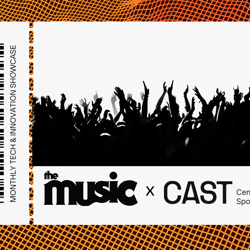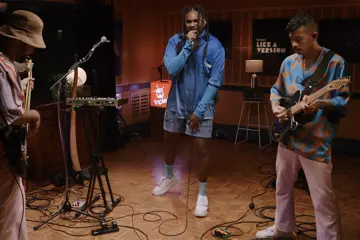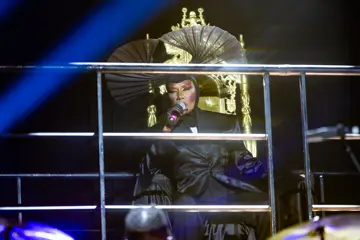 CAST (Centre For Arts, Sports & Technology)
CAST (Centre For Arts, Sports & Technology)Every time the music industry undergoes a major shift, technology takes the blame. Streaming, AI, and new distribution models are positioned as existential threats—yet behind the scenes; the biggest players are striking deals and investing in these same innovations while the debate plays out publicly.
For too long, the narrative has been artists vs. founders, a framing that has worked to the advantage of major labels. Artists—often unknowingly—become part of a cycle that gives labels a greater head start, while the real issue remains who controls the future of music. Each time, the major label playbook plays out the same way—and we miss it.
Alarm & Resistance – Frame new technology as a major threat to artists and the industry.
Mobilize Artists – Rally artists as the public face of opposition, emphasizing how the change could harm their livelihoods.
Secure Their Position – While the public fight plays out, labels negotiate deals, invest in the technology, and ensure they remain in control.
Shift & Adapt – Once their position is secured, they integrate the technology, leaving independent artists still outraged and wondering how the industry feels so against them.
This has to change. Instead of resisting, the opportunity is to engage early, take ownership, and shape the next wave of tech with artists getting some of the bag.
The Industry’s Relationship With Technology
Historically, technological shifts in music have been framed as threats before becoming essential parts of the business.
Streaming: Initially met with resistance, major labels eventually took equity stakes in platforms like Spotify, ensuring they would profit from streaming’s growth while leaving artists to navigate new revenue models.
Social Media & Short-Form Video: Once dismissed as unsustainable for artist careers, platforms like TikTok have become central to music promotion, with labels now investing in creator-driven marketing strategies.
AI & Music Generation: While AI-generated music is raising legal and ethical concerns, major labels have already made strategic investments in AI-driven platforms despite publicly calling for regulations to control its spread.
These examples illustrate a consistent trend: while technology reshapes the industry, the biggest players work to secure their advantage before new models become mainstream.
Recent Investments Reshaping the Industry
Don't miss a beat with our FREE daily newsletter
In 2024 and 2025, the music industry has seen significant investment flows into AI, independent distribution, and rights management. These deals are shaping how music will be created, distributed, and monetized in the coming years.
Universal Music Group’s $775M Acquisition of Downtown Music Holdings – This deal, currently awaiting regulatory approval, would give Universal control over independent distribution networks, including CD Baby and Songtrust.
Suno’s $125M Funding Round – The largest music AI investment in recent years, reflecting growing interest in generative music technology.
Warner Music and Universal’s AI Investments – Both labels have stakes in AI-driven music companies such as Soundful, LifeScore, and Authentic Artists.
Private Equity’s Growing Influence – Companies like KKR, Blackstone, and Hellman & Friedman are acquiring stakes in live entertainment, catalogue rights, and digital infrastructure, consolidating industry power.
While these investments shape the industry’s future, they are rarely discussed in the same conversations where artists are encouraged to debate technology’s impact. Artists have been focussing their fight exactly where the labels want it, and by now, we should be realising that it's not the right fight.
The Lack of Transparency and Industry Coverage
Many of these industry-shaping deals happen outside of public view, making it difficult for artists, managers, and independent entrepreneurs to understand the role they are playing in broader industry shifts. This lack of transparency creates an imbalance and leaves the two sides who care the most (artists + founders) locked in battle.
To counter this, we need more coverage of these deals in mainstream music publications and industry organizations. Independent research from sources like Water & Music is invaluable, but wider industry awareness is needed so artists can better understand the role they're playing in making tech the fall guy.
A More Proactive Approach: Engaging With Innovation Early
For artists, managers, and entrepreneurs, the best way to navigate these shifts is to actively participate in shaping them. This means moving beyond reacting to technological change and instead engaging with those building the next wave of industry infrastructure.
Collaborate With Emerging Platforms – Founders creating the next generation of music technology need industry insight. Artists and managers who work with early-stage companies can help shape models that work for creators rather than being designed solely for corporate investors.
Seek Positions of Influence – More artists and managers should sit on advisory boards and leadership teams of music-tech startups. This ensures that creators have a voice in how new technologies are structured.
Understand the Incentives at Play – By staying informed on where investments are flowing, artists and managers can better navigate industry shifts.
Adopt an Ownership Mindset – Instead of viewing new technology as a challenge, artists should explore opportunities for equity, partnerships, and direct-to-fan business models that allow them to benefit from innovation.
A Future Built With, Not For, Artists
The conversation around music technology needs to shift. It’s not about whether a particular innovation is good or bad—it’s about who is positioned to benefit from it. The truth is if artists don’t engage, the industry will shape the future without them.
This is what we're currently living through. It can no longer be about rejecting technology—it’s about ensuring artists have a role in shaping its future.
We’ve already seen how waiting until after the deals are made leaves artists with little leverage. If artists and industry professionals don’t take part in shaping new platforms and business models, they will continue to be positioned as passive participants rather than active stakeholders.
The industry is evolving, and the choices made today will define its future. The opportunity is there—the question is, who will take an active role in building it?
















